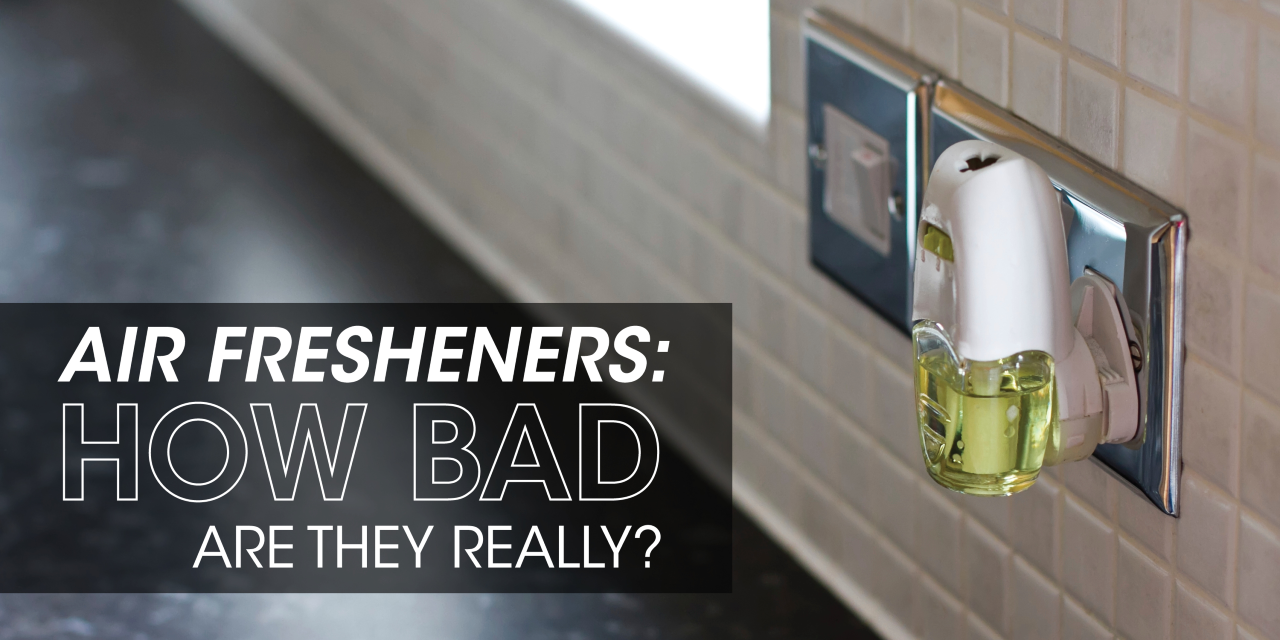Air Fresheners: How Bad Are They Really?

It is becoming common knowledge that chemical air fresheners are bad for you, from kitchen aerosol sprays to the candles in your bath and the air freshener hanging in your car. Are they worth the risk to cover up the smells that assault you daily, or are you better off tossing them in your ever-foul garbage can?
Unregulated and Untested
A 2007 study of 14 common household air fresheners by the environmental group NRDC uncovered that the majority of air fresheners contain chemicals that can aggravate asthma and affect reproductive development. The study found that 12 of 14 scented sprays, gels, and plug-ins contained phthalates, hormone-disrupting chemicals dangerous to infants and young children. Not a single product listed the chemical, which was even found in products labeled “all natural.” Manufacturers of these products are not required to disclose ingredients on labeling by law, despite health concerns and the fact that products are both inhaled and absorbed through the skin.
Chemical Cocktails
Exposure to the following chemicals in air fresheners can have a cumulative effect on health:
- Allergens
All chemical air fresheners contain irritants to the airways, according to a spokesperson for the American College of Allergy, Asthma and Immunology. - Volatile organic compounds (VOCs)
VOCs are known allergens, and according to the U.S. Environmental Protection Agency can produce eye, nose, and throat irritation, nausea, headaches, damage to the liver, kidneys, central nervous system, and more. VOCs also create secondary pollutants (like formaldehyde) when they react with ozone in the air. - Formaldehyde
A known carcinogen, formaldehyde, is found in significant amounts in electric air fresheners. When combined with other household air fresheners and outgassing from common household products, formaldehyde exposure is compounded and can result in eye, nose, or throat irritation, coughing, wheezing, bronchitis, and dizziness. - Phthalates
Hormone-disrupting chemicals found in 12 of 14 studied air fresheners may pose a particular health risk to babies and young children. Phthalates have been linked to birth defects, reproductive harm, changes in hormone levels, and poor semen quality. - 1,4 dichlorobenzene
Harmful to the lungs and found to result in liver cancer in mice with lifetime exposure.
Better Ways to Freshen Your Home
There are many simple and effective ways to decrease the health risks associated with chemical air fresheners and keep your home smelling fresh as spring. Air freshener alternatives include:
- Proper ventilation
Good ventilation systems eliminate the need to mask odors with air fresheners, naturally eliminating unpleasant odors. - Opening windows
To remove rather than mask odors. - Baking soda
Sprinkled on, baking soda absorbs and neutralizes smells. - White vinegar
Very effective for tough odors. Use it in the washing machine and dishwasher, or hide open containers around your home to soak up smells. - Spices
Boiling spices such as cinnamon, clove, nutmeg, ginger, and allspice in a little water on your stovetop can make your home smell mouth-watering. - Essential oils
If ventilating odors is simply not enough, essential oils offer a safe and effective alternative to chemical air fresheners. Make certain you’re purchasing “essential” oils, however, not “fragrance” oils, which also pack a chemical punch. Add a few drops to a diffuser, or simply place a few drops on cotton balls and distribute them in problem areas (for sensitive surfaces, place cotton balls on saran wrap or wax paper).
Contact Aire Serv
Are you taking care of your system so that it can take care of you by supplying your home with clean, fresh air? Stay up to date on routine annual maintenance for the health of your system and your family. Contact Aire Serv® today.
 Click to call
Click to call


